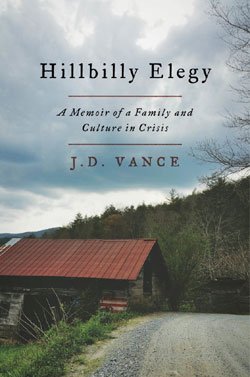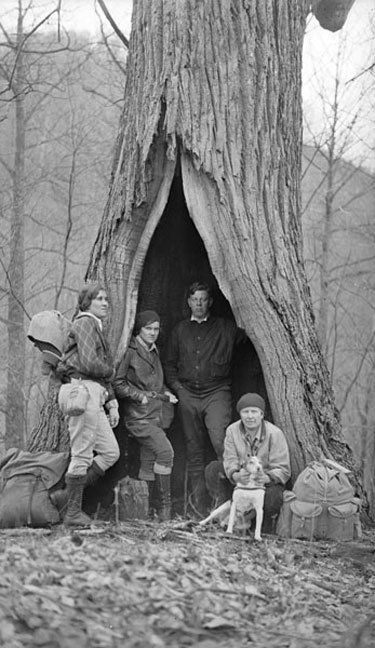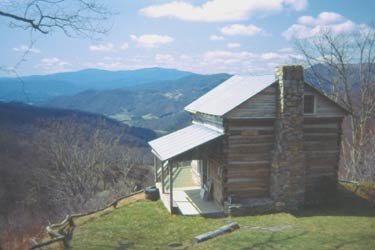Category Archive 'Appalachia'
04 Dec 2016


A sad view of my ruined hometown. The big boarded-up building is where I went to high school.
Brad King is writing a book about Appalachia.
Imagine you are in your mid-forties, you have two children, and you live in a place where there’s been no new businesses developed in the last thirty years. You live well off the beaten path, along one of myriad state routes that used to be the lifeblood of the country but now largely serve as a reminder of how forgotten you are. That lack of transportation infrastructure and cost of doing business due to regulations— oversight that you know makes your life better— discourages corporations big and small from coming into your town.
With no new businesses, increasingly you are forced to depend upon the government to provide you basic services like healthcare and unemployment insurance. You hate that, but you also have little choice. You don’t have the money — or connections — to move…somewhere else.
In each election season, you find yourself making a choice: continue receiving government help, which you know will not make your children’s life better, or forego those basic services in hopes that your town—one forgotten by the country— has the chance to create jobs that may provide you, and your children, the chance to carve out a life.
The choice each election season is the same, but the circumstances in which you live are getting worse because where you live isn’t part of the growth of the country.
So which do you choose: government help that you know will be there but that doesn’t provide a future, or the chance to maybe build something new (and knowing that if you fail, you will be worse off than you are)?
You must choose one or the other. If you decide not to choose, then you’re told you have no right to complain. And— by the way— no matter which you pick, people will chide you for being too stupid to know the right answer? …
After two hundreds years, the choice between the do-gooder who ends up stealing your money and the asshole who doesn’t care whether you live or die is pretty simple: I’ll take the asshole every time. And the people who seem to care the least about meddling in their business aren’t the Democrats, who waged a war on poverty and who have come trying to tell them how to fix their world. No, the people who believe in the least government and have a laissez-faire attitude about helping people are the Republicans.
The people who you think are voting against their self-interest are doing something quite different. They are just looking for a level playing field, one where they control their land, their economy, and their community. They aren’t voting against their own self-interest.
They are voting on themselves because nobody else has ever come to help them.
Read the whole thing.
30 Jun 2016


I grew up in a different portion of Appalachia and am of a different (Roman Catholic – Lithuanian) ethnic background, but I shared J.D. Vance’s experience, a generation earlier, of attending an elite Ivy League school as a blue-collar background outsider. Our town’s last coal mine closed in 1954, and my father had to bribe his way into the Steamfitters’ union, so that he could work all week four hours from home, and then return on weekends. The summer after my high school graduation, before entering Yale, I was working on the same kind of construction projects, installing new bathrooms in Scarsdale’s Taj Mahal High School. I can recall sitting on a box, during lunch, reading the Scarsdale High School Yearbook, and counting twelve graduates of that year who would be my classmates. Nobody in the entire history of Shenandoah, Pennsylvania, before me, had ever gone to Yale.
I am currently reading J.D. Vance’s Hillbilly Elegy, with which I have strong, natural sympathies.
Yale planted a seed of doubt in my mind about whether I belonged. This place was so beyond the pale for what I expected of myself. I knew zero Ivy League graduates back home; I was the first person in my nuclear family to go to college and the first person in my extended family to attend a professional school. When I arrived in August 2010, Yale had educated two of the three most recent Supreme Court justices and two of the most six recent presidents, not to mention the sitting secretary of state (Hillary Clinton). There was some- thing bizarre about Yale’s social rituals: the cocktail receptions and banquets that served as both professional networking and personal matchmaking events. I lived among newly christened members of what folks back home pejoratively call the “elites,†and by every outward appearance, I was one of them: I am a tall, white, straight male. I have never felt out of place in my entire life. But I did at Yale.
Part of it has to do with social class. A student survey found that over 95 percent of Yale Law’s students qualified as upper-middle-class or higher, and most of them qualified as outright wealthy. Obviously, I was neither upper-middle-class nor wealthy. Very few people at Yale Law School are like me. They may look like me, but for all of the Ivy League’s obsession with diversity, virtually everyone—black, white, Jewish, Muslim, whatever— comes from intact families who never worry about money. Early during my first year, after a late night of drinking with my classmates, we all decided to stop at a New Haven chicken joint. Our large group left an awful mess: dirty plates, chicken bones, ranch dressing and soda splattered on the tables, and so on. I couldn’t imagine leaving it all for some poor guy to clean up, so I stayed behind. Of a dozen classmates, only one person helped me: my buddy Jamil, who also came from a poorer background. Afterward, I told Jamil that we were probably the only people in the school who’d ever had to clean up someone else’s mess. He just nodded his head in silent agreement.
16 Mar 2016


Some Dark Hollow reminds us that there used to be giant trees, big enough for people to live in their hollow bases, right here in the Eastern United States, not only in California.
According to the Encyclopedia of West Virginia, the largest trees ever documented in the eastern states were three sycamores documented by George Washington in 1771 on the Three Brothers Islands in the Ohio River. Washington was amazed at the size of these trees and estimated in his diary that one of them was 61 feet in circumference at its base! …
• In 1750, explorers Jacob Marlin and Stephen Sewell headed westward across the Allegheny range and found there way to where the mouth of Knapps Creek empties into the Greenbrier River in what is now Pocahontas County, WV. The two men decided to settle in the area. They built a cabin in for themselves, but ended up having a falling-out. Their quarrel eventually reached a point where they were not speaking to each other. So Sewell moved to a large hollow sycamore tree which stood a short distance from the cabin and lived there for a period of time.
• The following year, when surveyors for the Greenbrier Land Company entered the area, they found Marlin and Sewell living quite happily in their separate dwelling places. It was also reported that each morning the two men greeted each other with pleasant salutations. After Sewell moved on farther west where he was later killed by Indians, his former sycamore tree house served as a temporary dwelling place for many others who passed that way in subsequent years and remained as a landmark until 1930.
• Another hollow sycamore tree story from West Virginia took place near Buckhannon in Upshur County. In 1761, during the French and Indian War, John and Samuel Pringle, with two other British soldiers, deserted the army at Fort Pitt and hid out in the wilderness of the Youghiogheny River Valley. The next year when the other two soldiers were arrested, the Pringle brothers moved southwestward into the Monongahela Valley where they worked with a trapper by the name of John Simpson until 1764. After having a quarrel with Simpson, the Pringles moved into the Buckhannon River Valley and at the mouth of Turkey Run they made their home in a large hollow sycamore tree.
They lived there for about three years, until their supplies ran low and John set out to replenish them. He returned seven weeks later with the news that the war had come to an end. No longer concerned about being arrested for desertion, the brothers decided to return to the eastern settlements where they hoped to recruit others to come settle the Buckhannon Valley with them. The next year, Samuel Pringle, with his new bride and several other people, came and established the first permanent homes in this valley and, for a time, Samuel and his wife made their home in the hollow sycamore tree.
The giant chestnuts are gone in Pennsylvania, killed by the blight, but I know several places where you can see original first growth trees still standing.
12 Dec 2013


My cabin has a first story stone foundation, and there is snow and ice everywhere, but this picture gives a general idea of what my PA farm is like.
Woodpile Report praises my own native Appalachians, as the American region least assimilated into the community of fashion’s version of modernity, as a practical refuge from taxes and regulation, and as the probable main site of future resistance to the regime.
Appalachia’s quantifiable attributes most easily lead inquiry away from understanding, toward misunderstanding in fact. It’s a case of finding what you want to find. Wealth can be measured in many ways, not all of them obvious. Life is tightly organized around family and friends and neighbors, one reason the towns are small and run down, they aren’t the centers of anything except themselves. Hill folk take care to be on good terms with each other, even tertiary relationships are valued and well maintained. Communities are stable over long periods of time because, while there’s more personal latitude than elsewhere, there’s also an understanding of orderliness that isn’t violated without consequence.
Appalachians don’t have the exaggerated need to avoid failure so typical of their observers, they live their lives first hand as it were and learn from their missteps, after all, success without failure can only end in delusion and disaster. The larger sense of Appalachian self reliance means to live from within oneself. It’s assumed a person ought to form his own opinions and rely on his own judgments. Failure to do so marks a person as mushy and untrustworthy. Self reliance is self-correcting, responsibility for failure and credit for success is personal and directly attributable. Those who choose a life directed by others will never know success because success belongs to their masters. How could it be otherwise? The Pelosis and Obamas of this country don’t come from Appalachia. But let’s get back to Appalachia’s place as guerilla territory in doomer fiction. …
[U]nlike the western mountains, the Appalachians are damp, have a continuous canopy of hardwoods, and they’re lacey with creeks and dotted with springs. In the summer there’s a general haze. It’s how the Blue Ridge and Great Smoky Mountains got their name—incidentally, the various parts of the Appalachians go by local names, the Cumberland Plateau and Alleghenys and so forth. They’re full of odd nooks and outcroppings and side ravines, with the occasional cave or white water rapids. Its forests are the most biologically diverse in North America, likely to have been the primary reseeding source for the present interglacial period.
Game is plentiful and the fishing is excellent. But the heat and humidity and bugs in the summer, the rain or snow and cold in winter, the aggressive feral hogs, and the coyotes and bears and snakes, and the sheer ruggedness of the Appalachians are something to prepare for seriously and thoroughly. The so-called Appalachian Redoubt is probably a fiction, on the other hand, nobody’s up in “them thar hills” accidently. A cautious person can enter in one place, travel without much risk of detection for hundreds of miles north or south, and come out another place altogether. Doomer writers get it right, as a homeland for an insurgency—fictional of course—or for bugging out and getting lost on purpose, it doesn’t get much better.
Hat tip to Vanderleun.
Your are browsing
the Archives of Never Yet Melted in the 'Appalachia' Category.
/div>

Feeds
|







